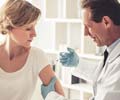Measles Immunization Day is observed every year to raise awareness about the measles disease and the role of vaccines to prevent it.
- Measles is a highly contagious viral disease that can be fatal for children
- It can spread to others through contact with nasal and throat secretion
- There are no specific treatments, and vaccination is the only hope
Read More..
Measles
Measles is a highly infectious viral disease that remains an important cause of death among young children globally despite the availability of a safe and effective vaccine. Measles can also lead to severe complications such as blindness, pneumonia (lung infection), and encephalitis (brain swelling). The initial symptoms start with fever, cough, runny nose, and red eyes. Later, a skin rash appears like tiny, red spots break out. It starts from the face and then spreads to the rest of the body.Important Facts About Measles
- More than 140,000 deaths due to measles occur globally among children under the age of five.
- About one in five people in the world who get measles will be hospitalized.
- Measles is a human disease and is not known to occur in animals.
- One to three out of 1,000 people with measles will die, even with the best care.
- The virus remains active and contagious in the air or on surfaces for up to 2 hours.
- One person infected with measles can infect about 12 to 18 other persons.
- Measles vaccination resulted in a 73% drop in measles deaths between 2000 and 2018 worldwide.
- About 86% of the world's children received one dose of the measles vaccine by their first birthday.
- Measles vaccination prevented an estimated 23.2 million deaths making it one of the best buys in public health.
- Widespread use of the measles vaccine has led to a 99% reduction in measles cases compared with the pre-vaccine era.
Measles Prevention
Vaccination is the best way to prevent measles. Receiving two doses of a measles-containing vaccine is considered immune and unlikely to get measles.MMR (measles, mumps, and rubella) vaccine combined with mumps and rubella vaccines provides long-lasting protection against all strains of measles. A first dose is recommended on or after their first birthday. A second dose is recommended before entering the school at 4 to 6 years of age.
If your family is traveling overseas, the baby is 6 through 11 months old should receive 1 dose of MMR vaccine before leaving. If your child is 12 months of age or older, they will need 2 doses of MMR vaccine at the gap of 28 days before departure.
Another vaccine, the measles-mumps-rubella-varicella (MMRV), also protects against four diseases. It is available to children from 12 months through 12 years of age.
Consult your healthcare provider to know more about the measles, mumps, and rubella (MMR) vaccine.
References:
- Vaccine for Measles - (https://www.cdc.gov/measles/vaccination.html)
- Measles - (https://www.who.int/news-room/fact-sheets/detail/measles)
- Measles & Rubella - (https://measlesrubellainitiative.org/resources/advocacy-tools/)
Source-Medindia














